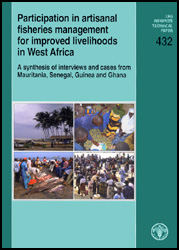 by
byNoeky M. Lenselink
Rural Development Sociologist (Associate Expert)
Fishing Technology Service, Fishery Industries Division
FAO Fisheries Department
 by
by
Noeky M. Lenselink
Rural Development Sociologist (Associate Expert)
Fishing Technology Service, Fishery Industries Division
FAO Fisheries Department
Food and Agriculture Organization of the United Nations
Rome, 2002
ISSN 0429-9345
FAO FISHERIES TECHNICAL PAPER
432
|
The designations employed and the presentation of material in this information product do not imply the expression of any opinion whatsoever on the part of the Food and Agriculture Organization of the United Nations concerning the legal status of any country, territory, city or area or of its authorities, or concerning the delimitation of its frontiers or boundaries. |
ISBN 92-5-104841-X
All rights reserved. Reproduction and dissemination of material in this information product for educational or other non-commercial purposes are authorized without any prior written permission from the copyright holders provided the source is fully acknowledged. Reproduction of material in this information product for resale or other commercial purposes is prohibited without written permission of the copyright holders. Applications for such permission should be addressed to the Chief, Publishing Management Service, Information Division, FAO, Viale delle Terme di Caracalla, 00100 Rome, Italy or by e-mail to [email protected]
© FAO 2002
1.1 The study
1.2 Methodology
1.3 Theoretical approach
1.4 Structure of this document
2. ARTISANAL FISHERIES AND ARTISANAL FISHERS
2.1 Fisheries and livelihood contexts in the case study countries
2.2 Who are the artisanal fishers?
2.3 How are artisanal fishers organized and represented?
3. FISHERIES ADMINISTRATION AND MANAGEMENT
3.1 How is the fisheries administration organized?
3.2 What are the existing mechanisms for collaboration?
3.3 Which rules regulate artisanal fishing?
4. THE CASE STUDIES ON ARTISANAL FISHERIES MANAGEMENT MECHANISMS
4.1 Introduction to the case studies
4.2 Description of the case studies
5. ANALYSIS OF THE CASE STUDIES
5.1 Strengths and constraints
5.2 The respective roles of artisanal fishers and government
5.3 Interaction between fisheries management and fisheries livelihoods
6. TOWARDS LIVELIHOODS-CENTRED FISHERIES MANAGEMENT
6.1 Revisiting the assumptions
6.2 Facilitating and complicating factors
6.3 Recommendations for livelihoods-centred fisheries management
7.1 The country case study reports
7.2 Other quoted and related literature
8.1 Expected Outputs of the Sustainable Fisheries Livelihoods Programme
8.2 Causes of accidents at sea (from the four country reports)